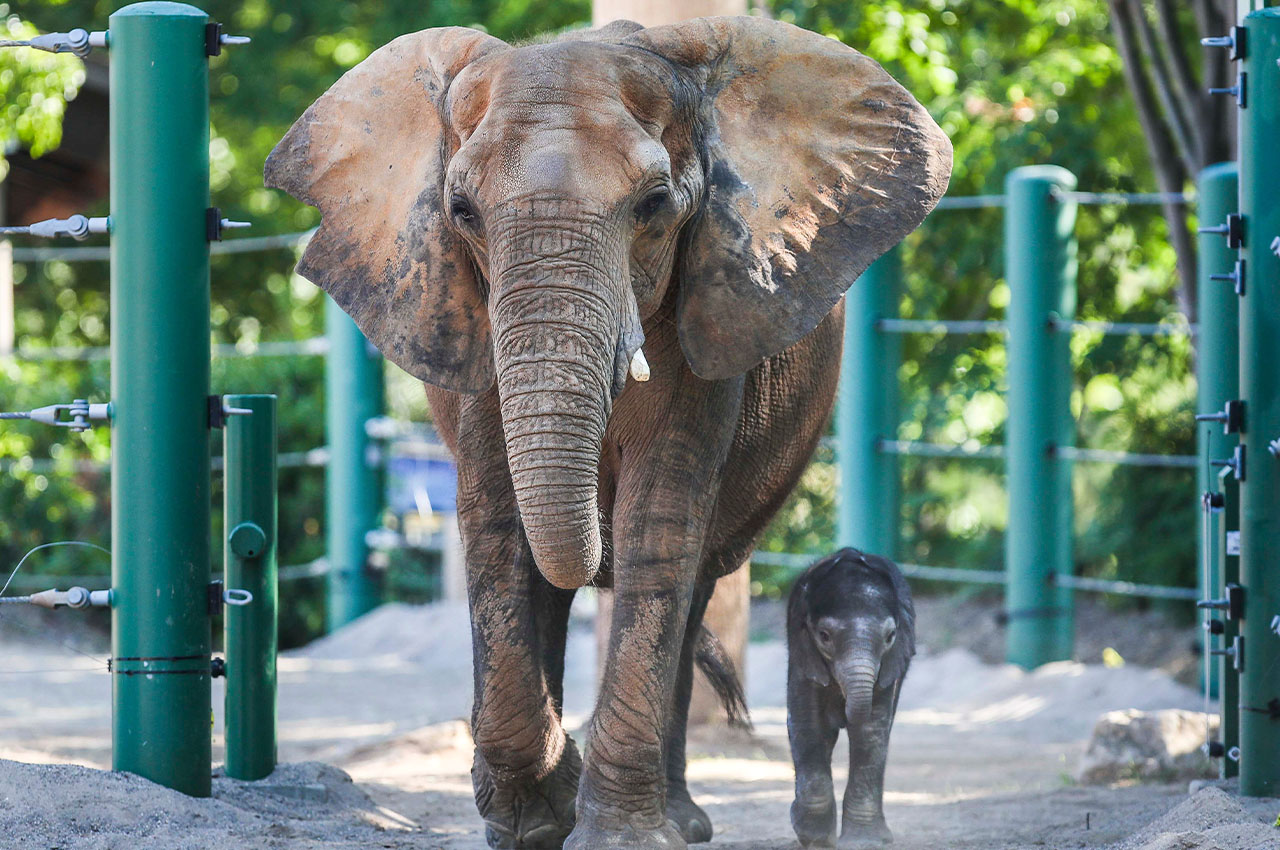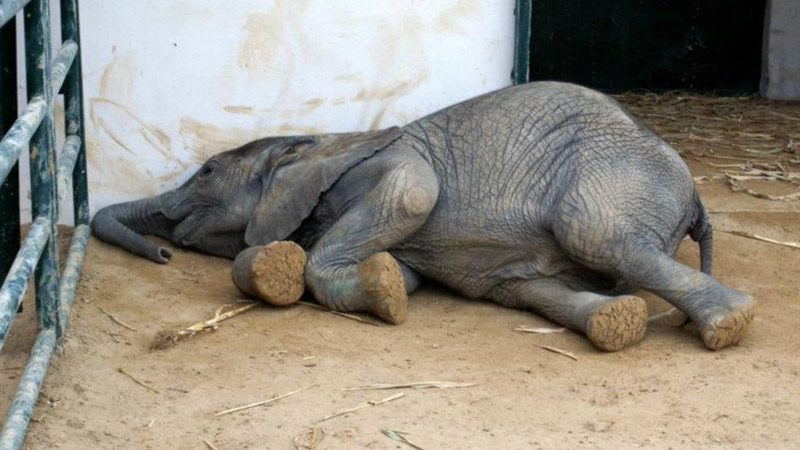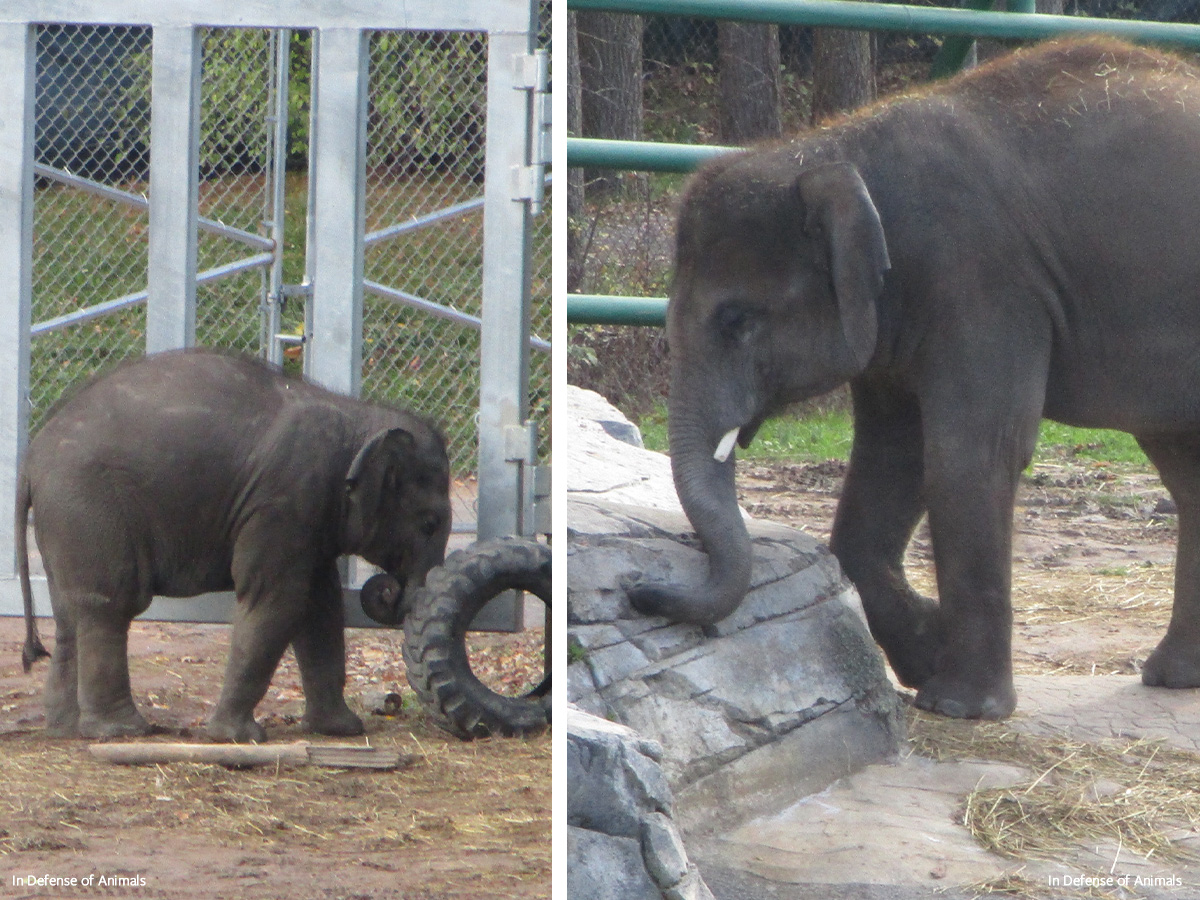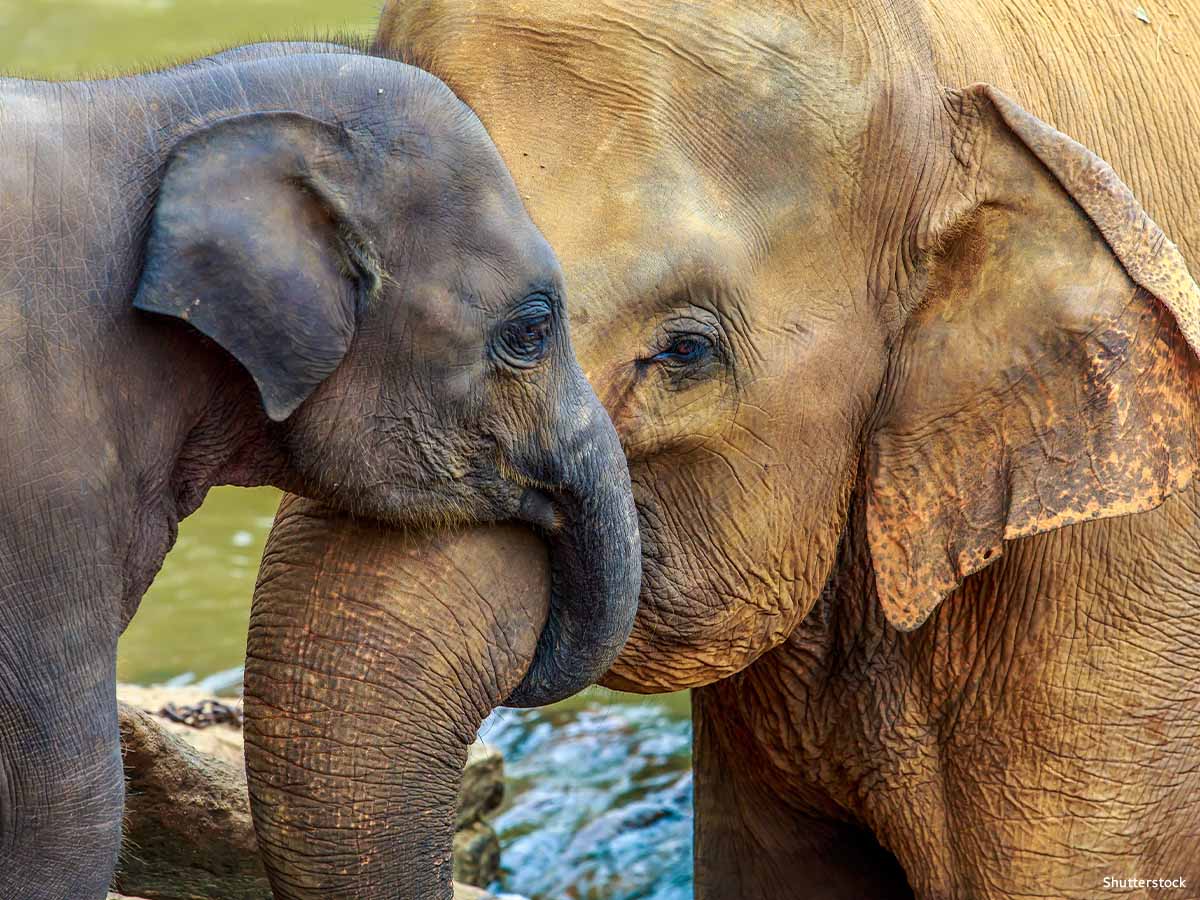The Truth About Baby Elephants
They're big. They're cute. They suffer.
Baby animals boost zoo ticket sales like nothing else. Elephant babies are among the most valuable promotional tools of all, and zoos will stop at nothing to get them. In Defense of Animals is exposing the sad reality behind cute baby elephants at the zoo.
How Elephants Breed in Captivity
Elephants breed poorly in captivity because they cannot thrive in zoos. Zoos strip elephants of their autonomy and independence in every aspect of their lives, even their reproduction. Captive elephants have little to no choice of who they breed with. In a desperate bid to draw in visitors and sustain dying captive elephant populations, zoos take control of elephant reproduction away from elephants into their own hands, choosing domination over decency.
To make baby elephants, zoos inflict invasive procedures on elephants’ most sensitive and private parts. They resort to invasive, abusive artificial insemination (AI) to force elephant pregnancies which only occasionally produce money-making babies.
Elephant Artificial Insemination (AI)
The gory details of elephant reproduction in zoos looks a lot like sexual assault.
Male elephants are anally raped to obtain sperm for artificial insemination. Whether electro ejaculation or manual massage is used, staff use their arm to penetrate deep inside the elephant to get to his sexual organs. The procedure is repeated and repeated until the desired amount and quality of sperm are produced.
Females also endure extremely invasive procedures during the process of insemination, sometimes under restraint. They often endure multiple rounds of AI before becoming pregnant.
Some of the semen used is stolen from wild elephants in a dreadfully cruel process with poor results.
In 2018, the Louisville Zoo in Kentucky announced a baby elephant was on the way. Mikki, a 32-year-old African elephant, was pregnant. What the zoo did not share, is that this pregnancy was forced upon Mikki through repetitive, clumsy, and very invasive AI attempts.
To make Mikki pregnant, Louisville Zoo chained Mikki by one front leg and tethered both of her rear legs with ropes. The bonds immobilized her so she was unable to move while keepers' attempted “successful” penetrations into her three-foot long reproductive tract.
The Louisville Zoo — which has been shamed three times on our list of the 10 Worst Zoos for Elephants — revealed that it forced Mikki to endure nine brutal AI attempts and three “practice” sessions in less than two years between 2014 and 2016.

Mikki's calf Scotty died at age three from colic in 2010. Mikki then suffered seven years of repeated and failed artificial insemination attempts by Louisville Zoo to have Fitz. Photo: Matt Stone/Courier Journal, Louisville Courier Journal via Imagn Content Services, LLC
Dead Baby Elephants
In captive elephants, the infant mortality rate is a shocking 40%. Captive facilities keep breeding elephants despite the deaths, and continue to breed by any means.
At Louisville Zoo, Mikki had a baby Scotty, following one of several pregnancies forced upon her through AI. In 2010, her 3-year-old son died of colic. Since then, the Louisville Zoo has attempted to impregnate her again and again.
Baby elephants mean big bucks for zoos, luring visitors in the gates and driving ticket sales.
Conception through AI has a low rate of success. A 2012 Seattle Times report Elephants Are Dying Out in America’s Zoos found that, “success has been spotty, with miscarriages and premature and stillborn deaths from artificial-insemination pregnancies reaching 54 percent.”
Another scientific report compared AI with natural mating. It found that AI pregnancies result in three times more stillbirths than natural conception.
“The rate of stillbirths after A.I. was 33.3% and hence three times as high as after natural mating,” write Fred Kurt and Joachim Endres in their report, Some Remarks on the Success of Artificial Insemination in Elephants.
Stillbirths are punishing on mother elephants’ bodies, and they are forced to bear their grief without the comfort of their sisters, mothers, aunts and grandmothers as they would in a natural herd.
Babies Batu and Ajay died at Rosamond Gifford Zoo within days of each other. Photos: In Defense of Animals
Unwilling Elephant Sperm “Donors”
There is no real “natural” elephant mating at zoos. Zoos shuffle bull elephants around the country like chess pieces with the hope they will mate with females. These transfers are terribly cruel and exploitative, as the males’ welfare and vital social bonds are disregarded when they are treated as living “vessels” of sperm. In Defense of Animals calls this mistreatment “transfer abuse.”
Unintended Consequences, Unwanted Babies
AI has unintended consequences, resulting in over four times as many male offspring as females. This causes a glut of male elephants who are difficult and dangerous to keep because their natural physical and emotional needs are impossible to meet in a zoo environment.
Regardless of how many are born, every baby boy is a problem for zoos, because male elephants are notoriously more difficult to care for and contain than females. It's a tragedy for every male baby born in a zoo who survives to adulthood, since they will be confined for life in an unnatural and cramped exhibit that strips them of everything it means to be a powerful, virile bull elephant.
Elephant Endotheliotropic Herpesvirus (EEHV)
Elephant endotheliotropic herpesvirus (EEHV) is a major risk to all baby elephants born in zoos. EEHV attacks endothelial cells and ruptures blood vessels. The disease progresses rapidly through the body, causing catastrophic blood loss. The babies die of organ failure or hemorrhagic shock.
In 2009, ABQ BioPark Zoo celebrated when 17 year-old Rozie gave birth to her first baby, a girl they named Daizy. In 2012, the zoo released a video in which they boasted that their “Daizy Diagnostics Lab” had allowed Daizy to “become a model of how to counteract the threat of EEHV in a captive herd.”
Less than ten years later, Rozie had been forced to bear two more babies. Daizy died in 2009 at the age of five. Thorn died on Christmas day 2021 at the age of three. Jazmine died just eight days later. She was eight years old. All three died from EEHV.
It is well-documented that elephants mourn their dead. Rozie and her mother Alice watched all three babies suffer nightmarish deaths.

Infanticide, The Dark Secret of Elephant Breeding
In 2013, at Zoo Halle in Germany, moments after giving birth, elephant mom Bibi trampled her newborn male calf to death. Infanticide, virtually unheard of in the wild, is a common occurrence in zoos. It happens with new mothers and sometimes with experienced mothers, as in the case of Bibi, who had given birth twice before. At least one time, it was the other elephants at the zoo who killed the newborn. In 2020, at a zoo in Zurich, a six-year-old female gave birth to a male calf, and her fellow inmates at the zoo stomped on and killed him. That is an egregious tragedy for two reasons: the horrible killing and the fact that the zoo allowed a four-year-old elephant, who had started cycling at an extremely early age, to be impregnated and give birth at age six.
On several occasions, the mother attempts but fails to kill the newborn, usually because the zoo staff intervenes and removes the calf before she succeeds. In 2007, new mother Pori tried to crush her baby calf Dumbo and then drown him in their enclosure at Friedrichsfelde Animal Park in Berlin. The keepers saved him. In 2008, Rose-Tu stomped on her newborn calf Samudra at the Oregon Zoo. The staff pulled him out of harm's way.
There are several possibilities for why infanticide is common in zoos. The mother is too young. The AZA Association of Zoos & Aquariums allows female elephants to be pregnant as young as eight, which is far younger than the age at which wild elephants mate and get pregnant. The mother often has no other elephant mothers to learn from. Or it could be the stress of captivity, the unnatural environment, or a combination of factors. Some propose that the mother does not want her baby to grow up and live out his life in a zoo.
Interestingly, many infant deaths by infanticide are males. Perhaps the mother knows instinctively that the male's boisterous spirit will be broken in captivity. Learn more about the tormented lives of Bulls Behind Bars here. For all these reasons, it is clear that breeding elephants in zoos is dangerous and often deadly.
Captive Elephant Breeding Is a Conservation Con
Zoos acknowledge the deadly risks yet continue to recklessly experiment with elephants’ lives. Huge amounts of time and money are spent on abusive captive breeding practices that harm and kill elephants in zoos. The resources zoos spend on breeding programs could truly conserve and protect elephants in the wild.
No baby born in zoo captivity in the U.S. is ever relocated to the wild. Elephants born in zoos are forced to suffer a lifetime of suffering captivity-related illnesses before an early death. Captive elephant breeding management practices are just one of many reasons why zoo captivity for elephants is such a cruel and unnatural existence.
Don’t support zoos, or fall for their false conservation claims. Remember that zoo babies are really jail babies who have been created as a marketing tool to manipulate the public.
Speak up about the horrible cruelty forced upon elephants in zoos. Commit to supporting conservation — and conception — in the wild, not in captivity.
What You Can Do To Help Elephants
Donate to end elephant exploitation!
Act now for elephants by signing our urgent action alerts



